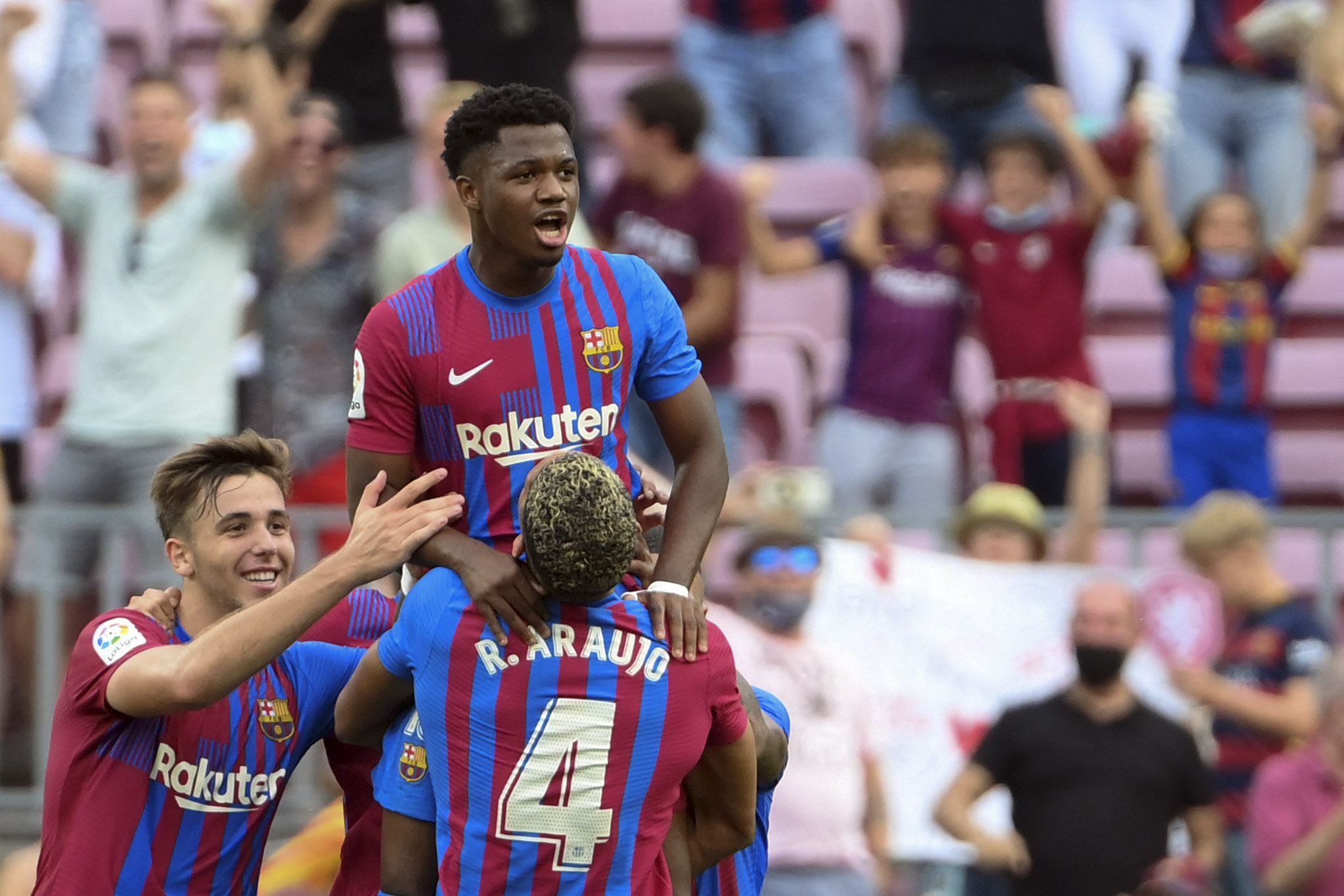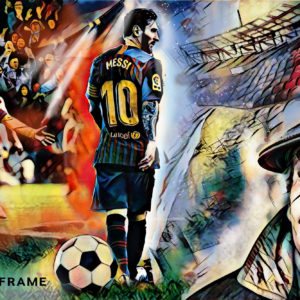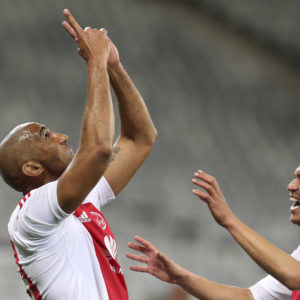Only injuries can dim Ansu Fati’s shine
The star, on his best day, is Barça’s main man. But injuries have, for a long time, been disturbing what was supposed to be his rapid rise to the top.
Author:
18 March 2022

The history of FC Barcelona is made of recurrent cycles of grandeur and misery. From time to time, a great star emerges and rescues Barça supporters from despair to lead them to glory in a matter of a few months.
That is what happened when Johan Cruyff arrived at Barcelona in 1973, roughly 14 years after the last championship. Or when Ronaldinho landed here, amid a climate of war within the club. History seemed to repeat itself with Ansu Fati, a football prodigy born in Guinea-Bissau in 2002. Despite being only 18, he was the only player capable of making culers (as Barça fans are known) dream again after Leo Messi’s sour departure last summer. However, a string of injuries has prevented it from happening. Or maybe, it has just delayed it.
Last August, Fati inherited the iconic No. 10 from Messi, the Argentinian legend who is considered one of the best football players of all time. The choice seemed right, since there are many points in common between them. They are both a product of La Masia, Barça’s youth academy. And they both excelled with the professional team at a very young age, when they were still minors. In fact, Fati even broke Messi’s records: on 14 September 2019, aged 16 years and 318 days, he became the youngest player in the history of Spanish La Liga to score and assist in a single match. It was his debut. A few weeks later, he became the youngest goalscorer in the Uefa Champions League when he scored the winner against Inter Milan at the San Siro.
Related article:
Many football stars at a mature age would have trembled under the pressure of filling Messi’s shoes. Fati did not. “I don’t feel [pressure], it is just an honour to play with the 10,” he declared in a press conference.
On 26 September, in his first match with the new number on the back, he needed less than 10 minutes to score a goal. The Camp Nou stadium went crazy. “Ansu is a special player for several reasons. Because of his inner strength, his calm, his ability to score so many goals at such a young age. La Masia rarely has been able to produce great players in that position,” argues Toni Padilla, a sports reporter for ARA newspaper and author of several books on football.
Fati’s jersey is the first one you find when you enter any Barça store. “At the start of the season, Ansu’s jersey was by far the most sold here. After his injury, the numbers went a little down,” says Noelia Sánchez, a clerk in the Barça store in the centre of Barcelona.
Injuries, and the early days
But a nightmare in the shape of injuries caught up with culers’ dreams. In early November 2021, a few days after leading Barça to its first Champions League victory of the season in Kyiv, the football prodigy had a muscular injury that took him off the pitch for two months. He reappeared in January with a goal against Barça’s most hated adversary, Real Madrid. But a few days later, he was injured again in Bilbao’s San Mamés. That evening, his smile turned into tears. So far, there is no date for his return. “Now he feels better, but the injury was a blow emotionally,” says his father, Bori Fati.
Ansu is not afraid of pressure, only injuries. This is not the first time that he experiences a grave injury. When he was only 13, he broke his tibia-fibula. He had to spend over six months recovering. But that did not prevent his progression.
“His state of mind is very strong. When he was a child, he was already like that,” says José Luís Pérez Mena, the manager of Peloteros Sierra Sur, the club where Fati started to play football when he arrived in Spain at age six. “The coach of the basketball team saw Ansu and his brother Braima playing football in the street and quickly came to me saying ‘You have to see this, there are two new kids who are amazing,’” recalls Pérez. And this is how they joined Peloteros, a club based in Herrera, a village close to Seville, in the south of Spain, with 6 500 people.

Fati’s emergence made a real splash in the Spanish media. That was mostly due to his skills. But not only that. The story of a migrant child whose family was welcomed by the mayor of Marinaleda – a village close to Herrera, which is a radical left-wing experiment of direct democracy – captured the attention of the media.
“I am very thankful to the mayor [Juan Manuel Sánchez] Gordillo. He gave me a job and he helped us a lot,” says Bori Fati while grinning. Fati senior, a middle-aged man wearing an elegant blue suit, was himself a football player in Guinea-Bissau, but he could not become a professional player. So he travelled to Portugal to make a living. But he was not very successful there. Later on, he moved to the south of Spain, where he worked as a driver and later as a waiter. His family joined him there a few years later.
The sensationalist press exaggerated the journey of the Fati family from poverty to wealth and fame. For example, some rumours claimed that Ansu and his four siblings reached the Spanish coast in a dinghy and that they lived in the streets. None of that is true. “A lot of lies have been published about us. For example, they say that he used to walk barefoot,” shrugs Bori Fati.
Nonetheless, according to Pérez, Peloteros had to provide Ansu and his brother Braima with the proper equipment, such as boots with cleats. That was Peloteros’ best investment ever. “Ansu was so good that he played with kids up to four years older. Otherwise, he would get bored. And he was still the best!” recalls the manager of the club, which is considered a model for values-based education.
An African; a Spaniard too.
Fati’s rise represents the coming of age of a new generation of youth who were either born in Spain from migrant parents or arrived there as little children. They are now reclaiming their space in a country that, having been among the poorest in Europe for many decades, did not become racially diverse until the economic boom of the late 90s.
“A figure like Ansu is very important to contain the growth of racism and far-right extremism. People feel he is one of their own. Other European countries already have had this kind of referents for decades, but not us,” believes Padilla, the sports journalist.
Nonetheless, Desirée Bela-Lobedde, a Black activist, is not so optimistic. “I don’t think that the emergence of local football players belonging to racial minorities will help in the fight against racism. There have been Black stars for many years. Sports, like music, is one of the domains where Blacks have been allowed to excel. A sort of exception.”
Related article:
Despite his youth, Fati is committed to social causes. “After his first match as a professional with Barça here in Seville, he spent literally two hours signing autographs for children. Fame did not go to Ansu’s head. He has a big heart. We are working with him on some development projects in the region,” said Pérez, who played a key role in the choice of Barça.
Fati played for three years in Peloteros before joining Sevilla FC, one of the best clubs in Spain. When he was 11, some of the best clubs in Europe were already chasing after him. “I know La Masia very well. It is not only a football academy, they really care about the education of the children. This is why I convinced the Fati family that Barça was the best place for him.”
When asked about an anecdote that explains who Fati is, Pérez does not hesitate to relate it. “We went to Madrid to play a tournament when he was around 10. We stayed at the homes of the players of the team organising the event. Since we had already qualified for semifinals, Ansu asked me to lose on purpose against the home team in the last match of qualifiers. He felt bad because they had lost all the previous games,” he recalls.

Pérez rejected the demand arguing that they needed to win in order to avoid the best team of the other group in the semifinals. Little Fati told him that he should not worry because he would take care of that later. “That game ended in a tie because Ansu made no effort. Then in the semifinals, Ansu scored four goals and we easily beat Atlético Madrid.”
Despite choosing the Spanish national team, Fati has not forgotten his African roots. “Of course, he feels a strong connection with Africa. He is African. We are African!” exclaims Bori Fati.
If injuries do not prevent it, Fati may soon join the list of African players who have dominated European football, such as George Weah and Samuel Eto’o. While being injured, Barcelona’s shape has improved a lot thanks to the signing of new players like Ferran Torres. Therefore, most probably, Fati will not have to rescue the team. But with him, Barça may be invincible again.


